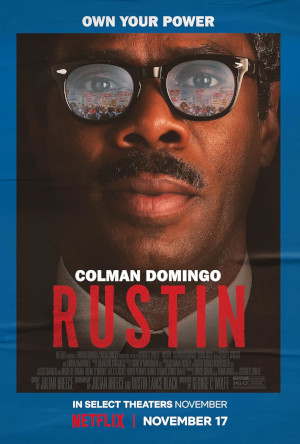Eye For Film >> Movies >> Rustin (2023) Film Review
Rustin
Reviewed by: Jennie Kermode

Progress has happened so fast since homophobia within the African American community began to break down that younger viewers watching this biopic by George C Wolfe may not remember just how bad it used to be. It’s not just that it was an issue in 1963, when it was equally prevalent amongst white people, but that it persisted at that level well into this century, shored up by a white regime which recognised its usefulness for creating division, to the point where stories about LGBTQ+ heroes like Bayard Rustin simply could not be told. Now that the silence is broken, the moment is right to tell his story and to celebrate the solidarity vital to progressing equality for everyone.
There have long been missing pieces in the standard account of the US civil rights struggle, and Rustin is one of them. He was important to the movement in many ways, but most crucially, he was the organising force behind the 1963 march on Washington and the rally at the Lincoln memorial remembered for Martin Luther King Jr’s “I have a dream” speech. It’s on this aspect of his story that Wolfe’s film focuses. Yet whilst this is an important film, and long overdue, it is, sadly, not a good film. Thrilling events which changed the world forever unfold here in pedestrian fashion. It is a telling of history rather than a showing, offering us no real insights into personalities beyond that of its hero. It’s poorly framed and the direction lacks dynamism. It would feel like a revealing and yet tedious history lesson, were it not for one thing.

That one thing is Colman Domingo’s performance. It’s difficult to imagine the famously shrewd yet antagonistic Rustin being better cast. Deservedly Oscar-nominated for his work, Domingo throws himself into the part, presenting viewers with a complicated man whose keen intelligence and lively wit are offset by a tendency to exploit the human resources around him without fully recognising what he’s doing. His Rustin has precisely the kind of charisma necessary for pulling off an action on the scale of the march, and for winning over different factions in spite of their hesitations about him and one another, yet he is also a man mired in private trauma, suffering the psychological after-effects of a brutal beating and the quiet terror that facing state homophobia as well as racism at the time could bring.
It’s a terror that those around him don’t quite understand, an awareness of a different type of vulnerability, and an inability to feel safe from discrimination even within the movement. Though we see him engaged in brief, passionate exchanges with a married pastor (Johnny Ramey) – a character invented for the film – he knows well enough that he needs to set his romantic life aside in order to carry out his work. That’s also tough on besotted assistant Tom (Gus Halper), whose whiteness gives him a little more liberty to express his sexuality – but it doesn’t shield Rustin from establishment attacks, and he knows that he can’t rely on others in the movement to stand up for him. In particular, differences over the religious implications of his sexuality have cost him the friendship of King Jr (Aml Ameen), creating one of the film’s few meaningful emotive arcs.
Much of the rest of what fills up the running time consists of reenactments of events with which viewers are already likely to be familiar, not least because they were captured on film at the time. We see Ruby Bridges walking to school in 1960, surrounded by guards, literally taking the first steps towards desegregation in Louisiana. We see Anne Moody refusing to leave a diner in 1963, as white people hurl food at her; and of course there is the march itself. There are also some unfilmed but widely recorded scenes focused on the conflicts internal to the movement. Chris Rock is almost unrecognisable as NAACP executive secretary Roy Wilkins, whose doubts about Rustin inspire him to excel, while Jeffrey Wright, one of Domingo’s rivals for the Oscar due to his sterling work in American Fiction, appears as Congressman Adam Clayton Powell Jr, whose concern with respectability politics is perhaps treated a little unfairly in light of the tremendous things that he achieved by setting aside his own freedoms.
The film’s final scene is perhaps its most powerful, though some will miss what’s happening. It would be easy to read Rustin’s choice as inspired purely by the humility that we like to associate with heroes, but the way Domingo plays it suggests something more tragic – a recognition that, despite his achievements, he can only push the envelope so far. It’s his only real decisive compromise and it weighs heavily in light of the erasure that would follow.
Of course, men in Rustin’s situation were not the only ones who took a back seat in the telling of history. A little earlier, the organisers of the march are asked why there are no women scheduled to speak. This feels like an observation intended to highlight the shortage of films about their contributions to the movement (cinema has recognised them in relation to some specific events, but not their work as organisers and decision-makers). One hopes that those missing films will soon be on their way. One also hopes that, welcome though the recent increase in stories about Black leaders is, it won’t constitute the last word, because Domingo’s contribution aside, this one could be told better.
Reviewed on: 10 Feb 2024
















